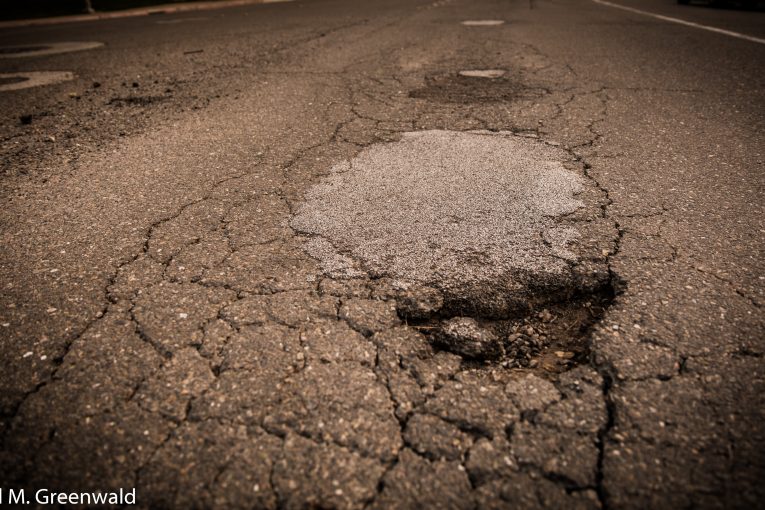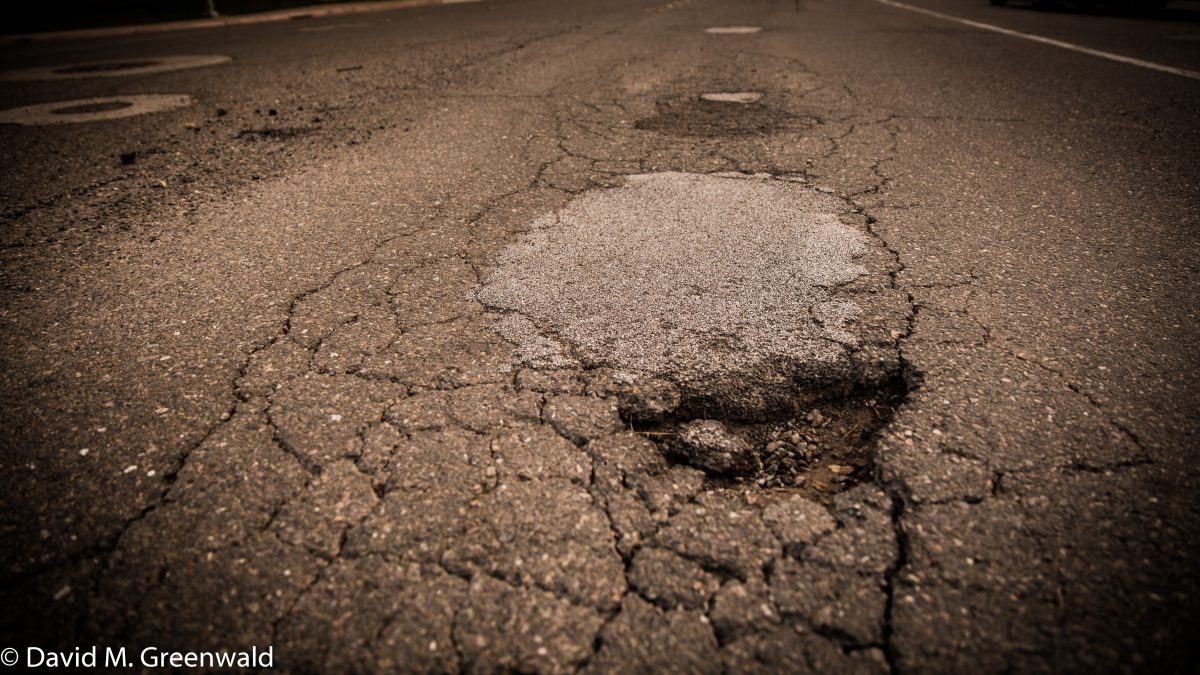

The city council on Tuesday will meet for the final time with Mayor Robb Davis as mayor and Rochelle Swanson as a councilmember. The last two years have been perhaps among the most productive we have seen in the last 12 years and the council deserves credit for addressing things as varied as Community Choice Energy, hotels, cannabis dispensaries, police oversight and student housing, to name just a handful.
While they deserve credit for getting better fiscal management tools, and identifying the long-term funding gaps that were hidden under previous accounting methods, one thing remains clear – we face an ongoing shortfall in revenues compared to long-term costs. One thing that they have not addressed further is the condition of our roadways.
It is not for lack of trying, as they put Measure I on the ballot. But, barring a miracle, that measure will go down to defeat when the final results are tallied.
One big question I have not seen calculated is that the costs of roads will continue to rise for two key reasons. First, inflation. The cost of oil has been going up, which is not good news because it means the cost of asphalt is going up as well. Some calculations have the cost increasing by as much as 8 percent per year.
However, there is a bigger problem – as the roadways continue to deteriorate, the cost to repair goes up multi-fold. And, while the city has enough to put in $3 to $4 million per year, the needs  are at least $8 million and perhaps higher.
are at least $8 million and perhaps higher.
So how much will the failure of Measure I cost the taxpayers in the long run? That’s ironic, given that the no vote was supposed to send a message to the city.
I have heard all sorts of things. I have heard that there is a lack of trust in city hall. I have heard, interestingly enough, from multiple sources – including some of the candidates in the field – that, while potholes were on the minds of voters, many of them expressed distrust with the city’s spending priorities.
I have heard that this would send a message to city hall, to once again look at constraining employee compensation and making further cuts.
Do we really want to figure out a way to cut another $8 million from the budget? Do we want to further cut services, which is what laying off employees would do? I have heard from some that we should go to defined contribution pensions, but it is not clear that we can do so legally or without the consent of the employees. I have heard that we should continue to cut compensation – but again, it’s unclear how that would work.
Besides, at this point I think our biggest problem is a revenue problem – not a spending problem. Spending in terms of employee compensation has largely been held in check since 2008, with only small COLAs being given to employee groups in the last decade. Costs have indeed gone up because the cost of pensions have risen, as have medical costs. But that for the most part is out of our hands.
On the other hand, as we have shown in previous articles, Davis ranks near the bottom in per capita sales tax and other revenue. There is some good news. Davis has seen an increase in TOT (transient occupancy tax) by about half a million per year and that is just based on the increase in the tax – the new hotels have not been built yet.
Moreover, with the approval of cannabis dispensaries and the potential for taxes, the city should get some additional revenue for that.
But the long-term strategy has to be economic development. At the top of my list of goals for the next council will be the strategy of economic development and fixing the roads.
Economic development is of course a long-term revenue fix. The short-term need is for a tax measure to fund our roads’ needs.
Here’s the thing: the vote doesn’t really send quite the message that opponents were hoping for. Getting a 57 percent yes vote doesn’t send the kind of message some might have wished. Instead, it suggests that the council made some strategic errors.
First, a majority of the people voted yes. In fact, a sizable majority voted yes. That tells me that the tax was passable, but council erred in going the parcel tax route rather than the Utility User Tax route. There were some reasons given by council, but at the end of the day, had they done a UUT, we would have a tax that passed, not one that failed.
Second, this was predictable. Previous polling showed about 55 percent support for such a tax. It got 57 percent.
Third, if you were going to go for a two-thirds tax – and there were advantages to doing so, including the ability to earmark the money – then you had to do a high profile, real campaign. The model for this kind of effort was the water measure from 2013. They had a campaign manager, they ran a field campaign, and they won it.
In this election, they sent out a mailer, but I doubt that they walked precincts or ran an organized campaign.
Finally, it was a bit questionable to have run this concurrent with the parks tax (which passed 73-27).
The lesson here is not that the city needs to change its ways, or that the voters are fatigued by taxes, it is that the city should have done a majority tax, a UUT. They will have to wait until June 2020 to do the next one – the two years’ delay could cost us around $10 million or so, by the way. But that is the approach that makes the most sense.
In the meantime, we should be continuing our cost containment measures and finding ways to expand our revenue, but I see those as long-term fixes whereas we need short-term help on the roads.
—David M. Greenwald reporting


Indeed… and so there’s a lot we can do to decrease the amount of damage we do to the roads:
* Driving less (replacing with trip by bike, consolidating personal trips or with neighbors, carpooling…)
* Consolidating and otherwise minimizing freight transport
* Implement a school bus program….
Some of this costs $$$ to implement. At the Bicycling, Transportation and Street Safety Commission (BTSSC) meeting on Thursday, after Brett Lee talked about Measure I losing I introduced my idea – mentioned here previously – to toll the Causeway crossing. One concept is that collecting $4 net from half of the cars that cross the Bypass would raise $100 million annually. Tolls on multiple bridges west of here managed by the MTC raise millions for transit. So we do the same here, and make people pay to use all the lanes. Define “transit” as trains and buses plus their complete, holistic support system (from local buses and automated shuttles, to bike share to bike infra. to judicious park & ride). Give control of some of the money to local cities for their own projects, and some for SACOG-managed projects. While freeways intersect many communities in the area, there needs to a fair formula that reflects how individual communities are affected by local freeways and, for example, the funding should not support transit to sprawled out communities, and communities with existing robust transit nodes – such as the Davis Depot – would get more points.
Anyway, the BTSSC expressed interest in this and asked for me to do research on what it would take to make it happen. If you can help with this, please write me at todd(at)deepstreets.org.
You don’t understand AC pavements, Todd… they are flexible pavements… if originally properly designed and constructed, non-use is very destructive to them… they need loads… you’d be correct if talking about rigid (ex., PCC) pavements…
The toll thing ain’t going to be a happening thing… even if it could the money would go to “owner” of I-80… the State…
Indeed, I learned about these “loads” here and it makes sense. But at some point the pot is seasoned, and while that makes it resilient it still needs care, but not so much use that it starts to wear out. Right?
The Bypass is crossed by a bridge. I am not sure what else it could be. The State owns a bunch of bridges that the MTC manages. These include the Golden Gate Bridge and many others which pre-date the habitation of vast areas for which they now provide transit funding. Right?
Wrong on both counts… the State does not own the Golden Gate Bridge, for example…
A toll bridge is one of the most regressive forms of taxation.
If you want to tax people for transportation projects, I urge you to try to be more progressive about it. Even a parcel tax is less harmful to lower-income people than a toll or similar flat user fee. And I suggest that any revenues funded by the tax need to be collected locally in order to stay local. So rather than expend energy on something that is unlikely to ever happen and would probably be harmful if it did, I suggest focusing on local revenue measures that can actually pass and that will serve the greatest number of people.
Don: Did you oppose the recent increase in gas tax (which is supposed to help fix local roads) because it’s “regressive”?
Do poor folks pollute less than rich folk, when they drive?
No, but the sprawl and lack of alternatives means that people are sort of captured by their cars. This is hard on lower-income people, but as I mentioned they can get some of their costs reduced.
Locals would get discounts and low-income residents of the region would be relieved of some of the costs. A parcel tax failed, we can’t do a regional gas tax, can we? Golden Gate Bridge tolls support buses and ferries. After a couple of years of 100 million net for the region, a huge amount of transit will come online, benefiting folks of all income levels (if done correctly) and ages.
http://www.wehavealongunderpricedbridgeinyolocounty.org
> That’s ironic, given that the no vote was supposed to send a message to the city.
“We hate cars, bicycles and pedestrians”